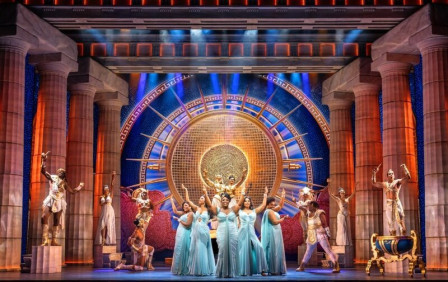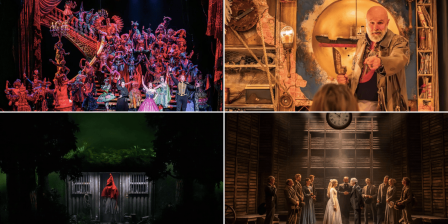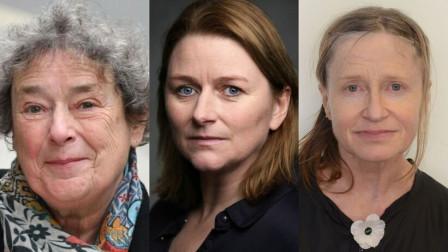Review: BORN WITH TEETH at Wyndham's Theatre
A number of academic sources have speculated on the likelihood that William Shakespeare consulted, or even collaborated with, rival/mentor Christopher Marlowe during his writing of the early historical trilogy Henry VI. Here, playwright Liz Duffy Adams speculatively corrals the pair in a room for 90minutes and permits us to view their interactions and shenanigans as she unveils her theory on events.
 Ncuti Gatwa and Edward Bluemel in Born With Teeth. Photo by Johan Persson.
Ncuti Gatwa and Edward Bluemel in Born With Teeth. Photo by Johan Persson.
Divided into three tempestuous moments when Shakespeare was variously a lowly playwright, an upcoming talent, and firmly in the ascendancy, we travel back to a time when Elizabethan England is ruled by a justifiably neurotic Queen. She has quelled the Spanish Armada but is running out of money and clinging to the hope that she can somehow stymie any future Catholic resurgence through a network of informants. Most of these spies (including playwright Marlowe) are beholden to court factions headed by the likes of Robert Cecil, or Walter Raleigh, all of whom are intent on keeping one step ahead of the other, retaining the Tudor monarch’s favour, and thus avoid being sent to the Tower.
Marlowe (Ncuti Gatwa) is loud, a celebrated poet and playwright, the subject of incessant gossip, rowdy, debauched and a lover of life and men. Will Shakespeare (Edward Bluemel) wants his writing to be an incognito observation on the world. He pens his histories, tragedies, and comic goings-on, far less concerned with court politics, dangerous factions, notoriety, or legacy. At least that is what Adams would have us believe in BORN WITH TEETH, currently playing at the Wyndham’s Theatre.
On a set backdropped by nearly 200 spotlights, a simple bench table and stools delineates the room in which our pair of playwrights joust, cajole and kiss. Yes they kiss, atop the aforementioned table, beneath the aforementioned lights. Did I mention the billowing shirts and leather doublet and hose? With sweat dripping from both men, they clinch and parry advances, leaving the audience gasping for air. The sexual tension and chemistry is palpable and not a little dizzying as Gatwa’s outrageously confident gay Marlowe, parades, preens and provokes the nervously bisexual Shakespeare into moments of playful shared endeavour, intimacy and nervous anger. His assuredness is at once infuriating yet also disarmingly watchable and at times downright funny. By contrast, Bluemel’s less worldly-wise Shakespeare, is a conformist and just wants to write. It is not until the latter stages of the play that we learn of his betrayal of Marlowe and progress in the world as indicated by Kit’s approval of his Venus and Adonis (which we’re clunkily reminded was written during an outbreak of plague which had forced the theatres to close) and his wearing of a finely made doublet.
The RSC’s Daniel Evans has directed with blowsy bonhomie, the roguish confidence and nervous reticence of the pair, as they attempt to conjoin their writing talents and possibly contain the more physical magnetism of their interactions. The end result is a dangerous delight albeit entirely speculative and debatable. Quills flutter, candles flicker and brilliance flashes as the two creative powerhouses pool their energies.
The aforementioned finale, in which we observe Kit and Will’s possible last meeting together, act as a prelude and confessional to Marlowe’s imminent stabbing at Deptford. Some licence has been deployed (undoubtedly conjured from oodles of research), but it still feels a tad theatrically contrived for the purposes of bringing the audience up to date about the dimly lit events of 30th May 1593. Historians agree that Marlowe was on bail following charges of heresy and blasphemy, but his assailant Ingram Frizer inexplicably received a full pardon a few weeks after striking the death blow (a stab through the eye) during a fracas over a pub bill, however no inquest records survive to confirm greater detail.
It ain’t perfect, but if this sexually charged, star-turn evening serves to energise exploration of Marlowe’s contribution to the English theatrical canon, it has achieved a worthy ambition.
BORN WITH TEETH continues its run at Wyndham's Theatre until 1st November.
Latest News

 DISNEY'S HERCULES extends for final time in the West End
9 February 2026 at 18:53
DISNEY'S HERCULES extends for final time in the West End
9 February 2026 at 18:53

 London Shows to Watch This Valentine's Day
9 February 2026 at 15:57
London Shows to Watch This Valentine's Day
9 February 2026 at 15:57
![Celebrity line-up confirmed for Park Theatre’s WHODUNNIT [UNREHEARSED] 4](/news/public/cast/.whodunnit__unrehearsed__4_cast_m.jpg)
 Celebrity line-up confirmed for Park Theatre’s WHODUNNIT [UNREHEARSED] 4
9 February 2026 at 14:32
Celebrity line-up confirmed for Park Theatre’s WHODUNNIT [UNREHEARSED] 4
9 February 2026 at 14:32

 Cast announced for CARE at Young Vic
9 February 2026 at 14:07
Cast announced for CARE at Young Vic
9 February 2026 at 14:07
